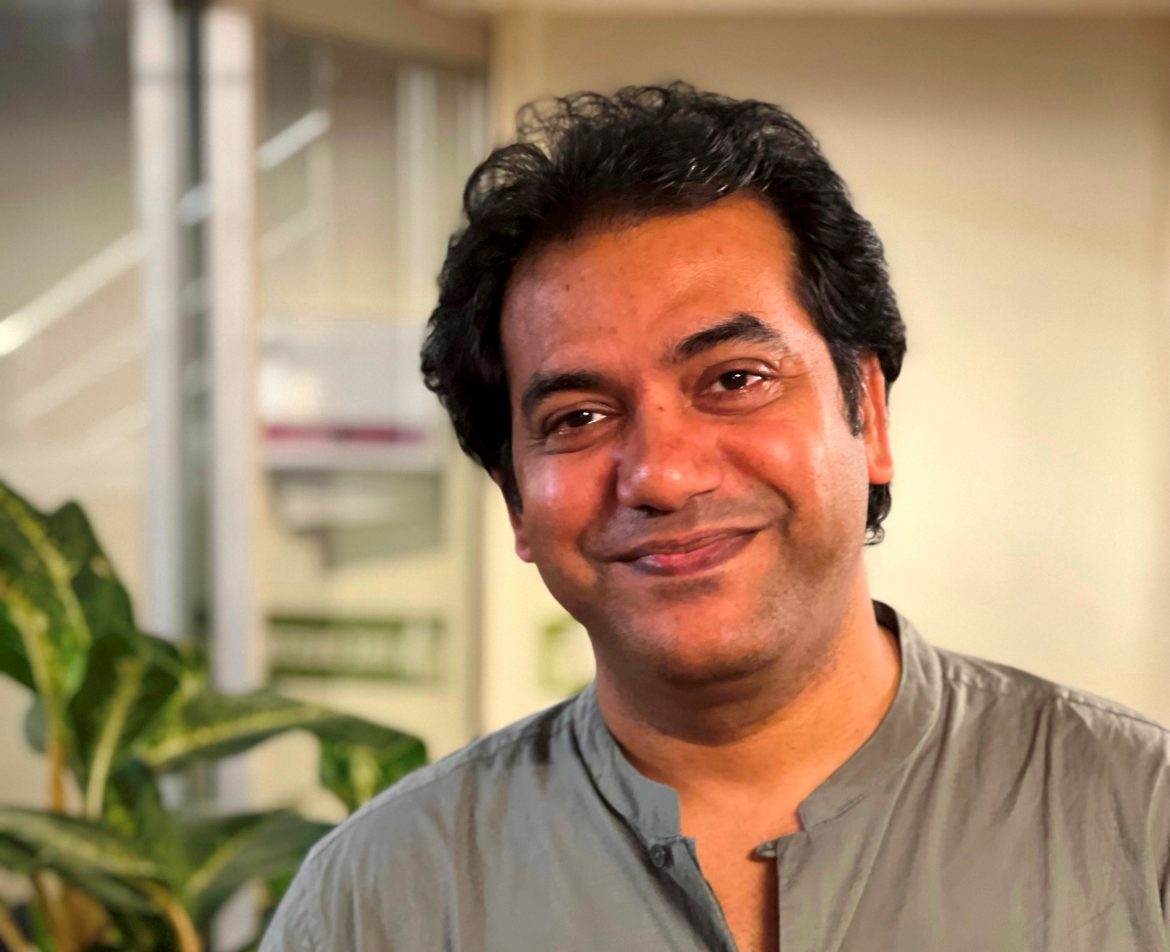Avneesh Mishra brought his group, Rangshila, back on stage after the long lockdown break, with Iss Desh Ka Yaaro Kya Kehna, a satire written by Lakshmikant Vaishnav.
“This pandemic period presented a crisis for theatre people,” he says. “In theatre it’s important to meet face-to-face. That stopped and the whole world was on Zoom. There was also the precarious financial situation. I experienced something strangely dramatic– there is a room in my home that is used like a storage space for all the play material, properties, costumes and all. It was raining heavily and the room was filled with water, soaking everything. I was sitting the midst of all wreckage and reminiscing about which play an object belonged to, when it was done, what happened then–my whole journey. I was thinking what to do, I could not take the isolation any more. I spoke to all my group members, and they were all despairing. Some wanted to return to their hometowns. I told them, go back, but please make provisions for a net connection. Whatever happens, we must not stop doing theatre, and we must not get depressed. We started reading our plays and doing workshops on Zoom. But it was tough. Then, when the lockdown was lifted for a while, we staged our plays Refund and Geet Gaan Aur Gatha.
After studying theatre at the Bhartendu Natya Academy in Lucknow followed by some months of training at the FTII, Pune, Avneesh came to Mumbai to be an actor. He met a lot of groups, but nothing interesting came up. “After doing so much theatre in Lucknow, I did not want to do bit parts. I ended up doing a mythological serial, and we were shooting at Umargaon. We used to be in costume and wig, waiting for hours. I had a good role, but I saw that stars from the stage, trained actors, who had done great work in theatre, were a part of crowd scenes. They were being ill-treated and abused by the production people. I was shocked and appalled at this sight. The script was that’s great either. I realized I just could not do this! I confided in Rajendra Gupta and told him, I was not enjoying this work. He asked me what I wanted to do. I said, I want to do theatre. He said, then don’t do this, do what you really want to.
“I was so motivated by his words, that I started doing street plays for small companies, then with bigger companies—corporate workshops, induction programmes, short motivational films. My work was appreciated. This is how I make a living, not from theatre shows.
“I realized, if you do a film, the resources and the people come aboard easily, for the exposure if nothing else. You have to make an effort to gather people for a play because doing theatre and surviving on just shows is very difficult. Everybody in theatre wants to eventually do films. They come from small towns and hope to make it in films, their parents have hopes pinned on them. Then, there is one Prithvi Theatre, how many productions can they fit into 365 days? You may perform anywhere, but till you perform at Prithvi, you don’t get that stamp of approval.
“My plays are usually musicals with a cast of at least 20-25, to get so many people; I’d say that is my strength and perhaps, also my weakness.”
In 2008, he set up his group Rangshila and did a comedy called Refund, about a man who wants his school to refund his fees, because his education did not help him in any way. “Luckily, I came in at a time when the groups were fluid, not rigid, closed organizations. People were friendly, willing to share resources and work in one another’s plays. I was new, still actors like Gopal Dutt and Akarsh Khurana were willing to act in my production.

The Great Raja Master Drama Company
“When I did Badal Sircar’s Teesvin Shatabdi, a powerful anti-war play, Tom Alter and Sudhir Pandey acted in it. Then I did a satire, The Great Raja Master Drama Company, in pure nautanki style, about a tailor who wants to do theatre. My plays were invited to all the major festivals, but unfortunately, due to shortage of dates at theatres, I wasn’t able to do too many shows. Uski takleef hai, but I will keep doing the work that inspires me.”
He is particularly proud of Geet Gaan Aur Gatha, which was a history of theatre music, and the musical, The Sun Set In The East, “For the latter, I did a lot of research on Hiralal Sen, a theatre and film maker in Kolkata of the 19th century. Dadasaheb Phalke is considered the father of Indian cinema but Hiralal Sen was also a pioneer; he made Alibaba And Forty Thieves, the first full length feature film, he is credited with India’s first advertising films and the first political film. He and Amarendra Dutta combined theatre and film at that time. It is a fascinating story and I worked hard on it.”
Mishra has acted in plays like Sandeep Shikhar’s Open Cast and Abhishek Majumdar’s #Supernova, but never acts in his own plays. “I don’t think I will be able to do justice to the play if I produce, direct and act. My mind will be on a dozen things.”
He is thinking of two musicals to do in the future and also reviving his earlier plays. “I am still at it, let’s see how successful I am. Till I am able to find good subjects, I will keep doing plays. Theatre hi karna hai, yeh sach hai.”
(This piece first appeared in mumbaitheatreguide.com)

